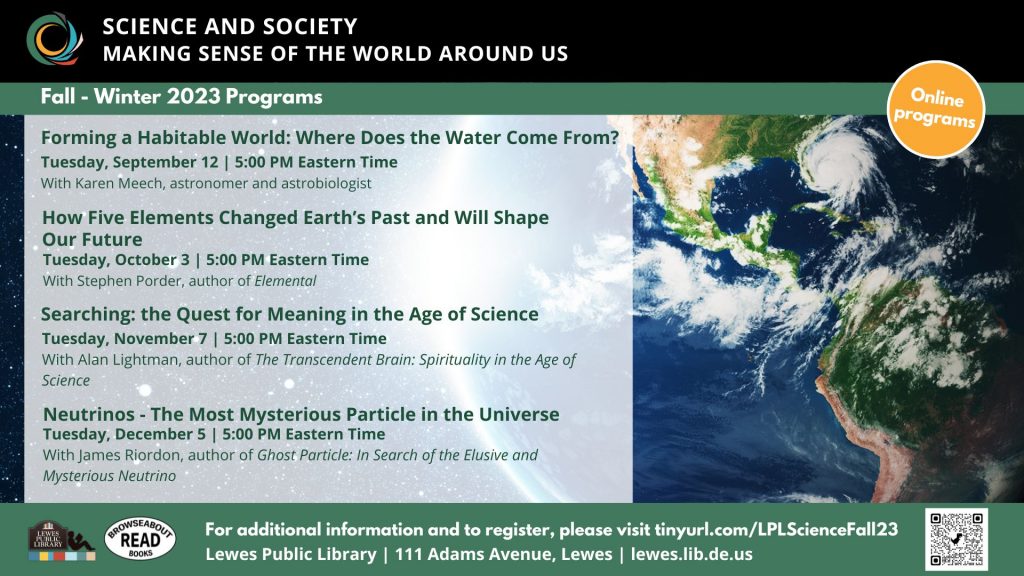Science and Society | Fall 2023

Join us online each month for the library’s “Science and Society – Making Sense of the World Around Us” lecture series. All lectures start at 5:00 PM Eastern Time. You MUST REGISTER to receive instructions for joining the program.
No one knows if our solar system, with a planet possessing the necessary ingredients for life within the “habitable zone,” is a cosmic rarity. We also don’t know if the gas giants in our solar system played a role in delivering the materials essential to life to the habitable zone. Our solar system does not have a common arrangement of planets. Does this have implications for Earth’s habitability? The answers to these questions are contained in the leftovers of the process of forming our solar system. Today, we observe these remnants of the birth of our solar system as comets and icy asteroids. In this Science and Society talk Karen Meech will explore how Earth might have gotten its water and how we are using astronomy, chemistry, meteorite science, geology and geochemistry to explore this question.
Karen Meech is an astronomer/astrobiologist who investigates how habitable worlds form, exploring the bigger picture of whether there is life elsewhere. Her work has embraced the power of interdisciplinary science and she is combining geological field work, geochemistry, astronomical observations, theory and space mission concepts to address fundamental questions about how Earth got its water. She began her career in physics and astronomy, with an undergraduate degree in Space Physics from Rice University and a Ph.D. in planetary physics from MIT in 1987 studying comets, after which she joined the faculty at the University of Hawai’i. She has served as the Graduate chair and the Interim Director for the IfA and has won many awards for her work. She was Co-Investigator on three comet missions: Deep Impact, EPOXI, and Stardust-NeXT. Meech has been leading the development of a space mission to study icy material in the asteroid belt, and leads the team to characterize the first interstellar object that was discovered passing through our solar system.
Join us for a discussion with Dr. Stephen Porder, about his new book, Elemental. He describes how three organisms—microbes, plants, and humans—profoundly transformed our planet over its 4-billion-year history, altering the climate and the trajectory of life on Earth. Microbes and plants harnessed the same five elements—hydrogen, oxygen, carbon, nitrogen, and phosphorus— to proliferate wildly across the planet. But their innovations eventually precipitated environmental catastrophes. Porder argues use of these same elements underpins the successes of human civilization, but unintended consequences of their use threaten grave, but predictable, environmental disasters. Given the elemental roots of our environmental challenges, Porder suggests we can learn from our world-changing predecessors to construct a more sustainable future. His book takes us deep into the Amazon, across fresh lava flows in Hawaii, and to the cornfields of the American Midwest to illuminate a potential path to sustainability.
Stephen Porder is Associate Provost for Sustainability at Brown University, where he is a Professor of Ecology, Evolutionary and Organismal Biology and a fellow in the Institute for Environment and Society. He is the author of over 70 peer reviewed publications on topics including the functioning of tropical rainforests and the ecological consequences of agricultural intensification. As Associate Provost, he leads Brown’s rapid decarbonization and transition to a fossil-fuel free campus. He is also founder of Possibly, a radio show/podcast on sustainability.
We invite you to support the author by purchasing a copy of their book from Browseabout Books by clicking HERE. Call-in orders are accepted at (302) 226-2665 or you can stop by the store to purchase a copy. For store hours, please visit their website. Each copy purchased comes with a signed archival bookplate.
Staring at the stars, falling in love, or listening to music, humans sometimes feel a connection with things bigger than ourselves. But these awe-inspiring experiences are not easily understood by science, which holds that all things can be explained in terms of atoms and molecules. In his latest book, The Transcendent Brain: Spirituality in the Age of Science, the novelist and physicist Alan Lightman draws on intellectual history and conversations with contemporary scientists, philosophers and psychologists to interrogate our place between these worlds. Can materialism explain our appreciation of beauty? Or our feelings of connection with nature and to other people? Is there a physical basis for consciousness, the most slippery of all scientific problems? Lightman weaves his investigations together to propose what he calls “spiritual materialism” – the belief that we can embrace spiritual experiences without letting go of our scientific worldview.
Alan Lightman is a writer, physicist, and social entrepreneur. Born in 1948, he was educated at Princeton and at the California Institute of Technology, where he received a PhD in theoretical physics. He is the professor of the practice of the humanities at MIT. His scientific research in astrophysics has concerned black holes, relativity theory, radiative processes, and the dynamics of systems of stars. His essays and articles have appeared in The Atlantic, Harper’s, the New Yorker, the New York Review of Books, and many other publications. His essays are often chosen by the New York Times as among the best essays of the year. Lightman is an elected fellow of the American Academy of Arts and Sciences. He is also the founder of the Harpswell Foundation, a nonprofit organization whose mission is “to advance a new generation of women leaders in Southeast Asia.”
We invite you to support the author by purchasing a copy of their book from Browseabout Books by clicking HERE. Call-in orders are accepted at (302) 226-2665 or you can stop by the store to purchase a copy. For store hours, please visit their website. Each copy purchased comes with a signed archival bookplate.
A hundred trillion neutrinos from the sun fly through you every second. At any moment, there are three hundred of these subatomic particles in the tip of your pinky alone that are ancient relics from the Big Bang. Neutrinos are key to explaining why the sun shines, and may even be the reason why you and everything else in the universe exists at all. And yet, scientists know surprisingly little about these ghostly particles that surround us and flow through us every moment of our lives. Experiments are on the verge of resolving many neutrino puzzles, but for now they are the most mysterious known particles in the universe. His book, Ghost Particle: In Search of the Elusive and Mysterious Neutrino, describes the neutrino’s discovery and the current status of research into this topic.
James Riordon is an author and science journalist who has written for Science News, Scientific American, Quanta Magazine, New Scientist, Popular Science, The Washington Post, Physics Today, and Analytical Chemistry. In his book Ghost Particle: In Search of the Elusive and Mysterious Neutrino, Riordon, along with co-author physicist Alan Chodos, take readers through the experiences of intrepid scientists and the challenges they faced, and continue to face, in their search for the ghostly neutrino. Riordon is a past President of the DC Science Writers Association and cofounder of the Southwest Science Writers Association. Riordon lives in Clarksville, Maryland with his science writer spouse Martha Heil, two daughters, and way too many family dogs, cats, and snakes.
We invite you to support the author by purchasing a copy of their book from Browseabout Books by clicking HERE. Call-in orders are accepted at (302) 226-2665 or you can stop by the store to purchase a copy. For store hours, please visit their website. Each copy purchased comes with a signed archival bookplate.
Online sessions are conducted through Zoom. If you have problems registering for an event or don’t receive the meeting instructions, please email us. Here are basic written instructions for using Zoom as well as a brief video tutorial. Closed captioning is available for all our sessions. Information on enabling closed captioning in Zoom may be found here.
These talks are co-organized and moderated by Fred Dylla, Executive Director Emeritus of the American Institute of Physics and author of Scientific Journeys, Linda Dylla, former public information officer at the Jefferson Laboratory and the U.S. Department of Energy, and Colin Norman, the former News Editor at Science.






